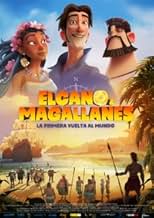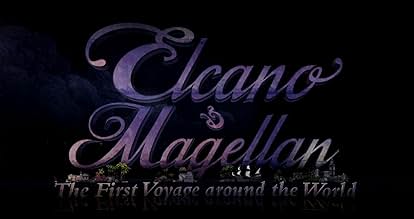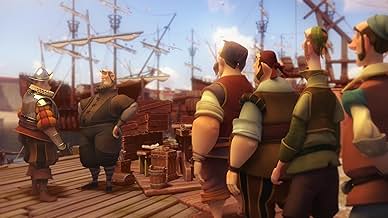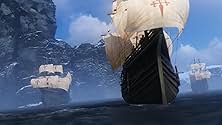Elcano y Magallanes. La primera vuelta al mundo
- 2019
- 1 Std. 30 Min.
IMDb-BEWERTUNG
4,5/10
455
IHRE BEWERTUNG
Füge eine Handlung in deiner Sprache hinzuStory of one of the most incredible adventures ever happened: the first trip around the world.Story of one of the most incredible adventures ever happened: the first trip around the world.Story of one of the most incredible adventures ever happened: the first trip around the world.
- Auszeichnungen
- 2 Nominierungen insgesamt
Kiko Jauregi
- Juan Sebastián Elcano
- (Synchronisation)
- (as Kiko Jáuregui)
- …
Iñaki Beraetxe
- Fernando de Magallanes
- (Synchronisation)
Aintzane Crujeiras
- Samar
- (Synchronisation)
- (as Aintzane Krujeiras)
Ander Vildósola Gala
- Antonio Pifagetta
- (Synchronisation)
Kandido Uranga
- Álvaro Dacosta
- (Synchronisation)
Xavier Alkiza
- Yago
- (Synchronisation)
Jon Samaniego
- Enrique de Malaca
- (Synchronisation)
Martín Zabala
- Gonzalo de Espinosa
- (Synchronisation)
Mañu Elizondo
- Juan de Cartagena
- (Synchronisation)
Jesús Izeta
- Juan Serrano
- (Synchronisation)
Mikel Fernández
- Gaspar de Quesada
- (Synchronisation)
- …
Asier Hernández
- Gómez
- (Synchronisation)
Eduardo Gorriño
- Amigo de Elcano
- (Synchronisation)
Vito Rogado
- Inés
- (Synchronisation)
Ramón Zalakain
- Banquero
- (Synchronisation)
- …
Joseba Sacristán
- Guardia
- (Synchronisation)
Judith Huegún
- Mujer Sevillana 1
- (Synchronisation)
Handlung
WUSSTEST DU SCHON:
- WissenswertesSome Twitter users also pointed out the similarities of the characters' designs to those of the 2000 American animated film The Road to El Dorado.
- VerbindungenReferenced in Estrenos Críticos: Julio 2019 (2019)
Ausgewählte Rezension
It is fashionable to insult past personalities because of their connection with Central Europe's colonial past. It's considered something "modern", and also a sign of sensitivity towards offended peoples, that is, the natives of countries colonized by Europeans. First, let me make a note to those who were outraged by a film about "colonizers": I am the Devil. I'm your worst nightmare, the incarnation of your hatreds, and I'm glad for it. Not only am I Portuguese, I am also a descendant of inquisitors, slave traders and navigators. But the most important thing (because I don't allow myself to be defined by my ancestors) is that I am a historian, for me the past is a serious matter.
As a historian, I say that the past is not judged, not censored, not rewritten to our liking and in the light of political correctness. The past is accepted as it is, so that we really learn something from it. And the truth is that until the 19th century (well, and even later sometimes), Europeans saw the world exclusively from their point of view. That is, if a newly discovered land had no Europeans living in it, it was from the European country that discovered and occupied it. This is wrong for us, because we see the rights of native peoples differently, but this is how Europeans thought, and it's not correct that we, today, are condemning them for acting in accordance with the mental and civilizational principles of their world and time! They could not have known that, five hundred years later, we would have completely different ideas, and we cannot expect men who lived in 1500 to behave like men from the year 2000. What I suggest, therefore, is that we know how to understand the past as he is, and understand the way of thinking of those men instead of judge them in light of what is right for us. It's the only way we don't say, or write, a lot of nonsense.
Regardless of opinions about the maritime expansion of Portugal or Castile (here, the film makes a mistake: Spain did not exist), the voyage made by Fernão de Magalhães (Magellan) was an unprecedented naval feat that continued for a long time without parallel: the two countries, in the Treaty of Tordesillas, had divided among themselves not only the right to the discovered lands but also the right to navigate the oceans: thus, going around the world was prohibited even for this trip and if Elcano did it, it was for get home alive. Magalhães was Portuguese and went to the Moluccas Islands - now in Indonesia - around 1501, in the service of the Portuguese king and before moving to Castile (he did so because the King of Portugal did not want to increase his salary). With this voyage, he became the first man to circle the world. Elcano, and the men he took home, became the first to circle the world in a single voyage. However, the main objective of this expedition was, as the film tells us, to sail westwards, through a passage between the South Atlantic and the Indian Ocean, and create a Spanish route to the Moluccas, an archipelago that the Castilians thought to be in their share of the world (the precise calculation of longitude led to doubts surrounding the rights over these islands).
The voyage took three years, one more than planned, had five ships and about 250 sailors of various countries (and at least 20 Portuguese). The passage between the oceans was discovered - it is the Strait of Magellan - but the main objective failed: the Moluccas were controlled by the Portuguese, and it was not possible to create the imagined route. Incidentally, Magalhães imagined a smaller world because he was unaware of the immensity of the Pacific Ocean. The Portuguese route was more viable and even safer. Great losses were added to this failure: the only ship that returned, with Elcano, had 18 sailors. Many men were killed or captured by the Portuguese, and the total number of survivors is about fifty people.
This film manages, somehow, to give some color to this whole story and continue what the Portuguese-Spanish history books did: transforming a voyage that went very badly into a success in the naval exploration of the two Iberian countries, something that Portuguese and Spanish people are proud of having done. Things are not as simple, the film gives way to playful factors and fun. It's not a documentary, it's a movie made to entertain. Of course, the film has a lot of anachronisms, there are a lot of situations where the characters act like us and think like us. There are gypsies reading fortunes when religious fanaticism prohibited it as witchcraft, there are women in knee-length skirts, men who hold cannons in their own hands and even some romance. Ironically, the villains are the Portuguese, the nation of Magalhães and which forgave this navigator long ago. Good and colorful cinematography in a funny portrayal of a remarkable trip around the world are the biggest attractions of this film.
As a historian, I say that the past is not judged, not censored, not rewritten to our liking and in the light of political correctness. The past is accepted as it is, so that we really learn something from it. And the truth is that until the 19th century (well, and even later sometimes), Europeans saw the world exclusively from their point of view. That is, if a newly discovered land had no Europeans living in it, it was from the European country that discovered and occupied it. This is wrong for us, because we see the rights of native peoples differently, but this is how Europeans thought, and it's not correct that we, today, are condemning them for acting in accordance with the mental and civilizational principles of their world and time! They could not have known that, five hundred years later, we would have completely different ideas, and we cannot expect men who lived in 1500 to behave like men from the year 2000. What I suggest, therefore, is that we know how to understand the past as he is, and understand the way of thinking of those men instead of judge them in light of what is right for us. It's the only way we don't say, or write, a lot of nonsense.
Regardless of opinions about the maritime expansion of Portugal or Castile (here, the film makes a mistake: Spain did not exist), the voyage made by Fernão de Magalhães (Magellan) was an unprecedented naval feat that continued for a long time without parallel: the two countries, in the Treaty of Tordesillas, had divided among themselves not only the right to the discovered lands but also the right to navigate the oceans: thus, going around the world was prohibited even for this trip and if Elcano did it, it was for get home alive. Magalhães was Portuguese and went to the Moluccas Islands - now in Indonesia - around 1501, in the service of the Portuguese king and before moving to Castile (he did so because the King of Portugal did not want to increase his salary). With this voyage, he became the first man to circle the world. Elcano, and the men he took home, became the first to circle the world in a single voyage. However, the main objective of this expedition was, as the film tells us, to sail westwards, through a passage between the South Atlantic and the Indian Ocean, and create a Spanish route to the Moluccas, an archipelago that the Castilians thought to be in their share of the world (the precise calculation of longitude led to doubts surrounding the rights over these islands).
The voyage took three years, one more than planned, had five ships and about 250 sailors of various countries (and at least 20 Portuguese). The passage between the oceans was discovered - it is the Strait of Magellan - but the main objective failed: the Moluccas were controlled by the Portuguese, and it was not possible to create the imagined route. Incidentally, Magalhães imagined a smaller world because he was unaware of the immensity of the Pacific Ocean. The Portuguese route was more viable and even safer. Great losses were added to this failure: the only ship that returned, with Elcano, had 18 sailors. Many men were killed or captured by the Portuguese, and the total number of survivors is about fifty people.
This film manages, somehow, to give some color to this whole story and continue what the Portuguese-Spanish history books did: transforming a voyage that went very badly into a success in the naval exploration of the two Iberian countries, something that Portuguese and Spanish people are proud of having done. Things are not as simple, the film gives way to playful factors and fun. It's not a documentary, it's a movie made to entertain. Of course, the film has a lot of anachronisms, there are a lot of situations where the characters act like us and think like us. There are gypsies reading fortunes when religious fanaticism prohibited it as witchcraft, there are women in knee-length skirts, men who hold cannons in their own hands and even some romance. Ironically, the villains are the Portuguese, the nation of Magalhães and which forgave this navigator long ago. Good and colorful cinematography in a funny portrayal of a remarkable trip around the world are the biggest attractions of this film.
- filipemanuelneto
- 1. Mai 2023
- Permalink
Top-Auswahl
Melde dich zum Bewerten an und greife auf die Watchlist für personalisierte Empfehlungen zu.
Details
- Erscheinungsdatum
- Herkunftsland
- Offizieller Standort
- Sprachen
- Auch bekannt als
- Elcano & Magellan: The First Voyage Around the World
- Produktionsfirmen
- Weitere beteiligte Unternehmen bei IMDbPro anzeigen
Box Office
- Weltweiter Bruttoertrag
- 347.264 $
- Laufzeit1 Stunde 30 Minuten
- Farbe
- Sound-Mix
Zu dieser Seite beitragen
Bearbeitung vorschlagen oder fehlenden Inhalt hinzufügen

Oberste Lücke
By what name was Elcano y Magallanes. La primera vuelta al mundo (2019) officially released in Canada in English?
Antwort
![Tráiler [OV] ansehen](https://m.media-amazon.com/images/M/MV5BM2MyNGNjNDItODA0MC00OTI1LTg0MGUtNThiNjBlMzIxZTM0XkEyXkFqcGdeQXRyYW5zY29kZS13b3JrZmxvdw@@._V1_QL75_UX500_CR0)


















